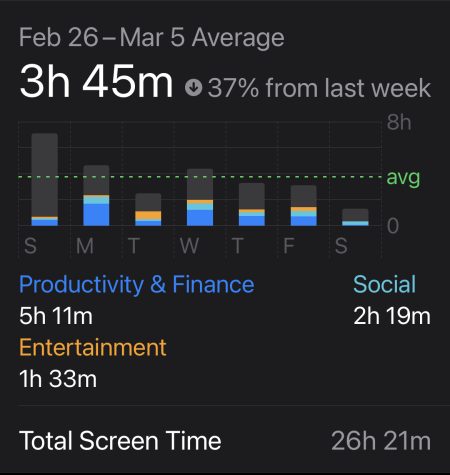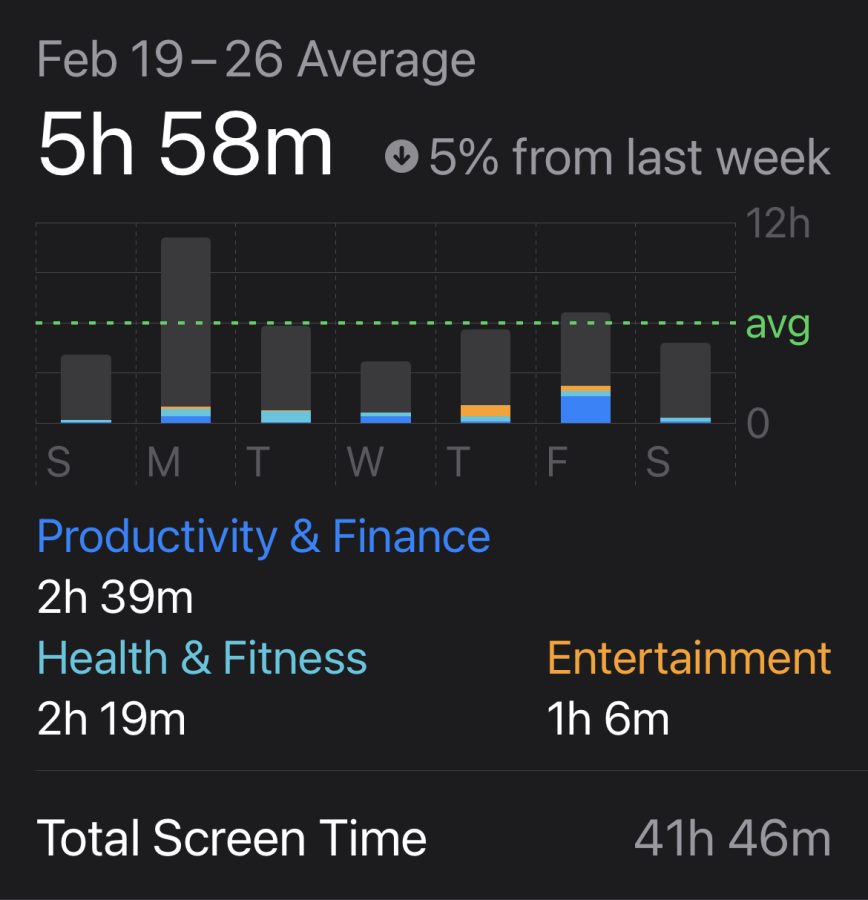I stopped using social media for a week, this is what I learned
Screenshot of screen time used by the author in the week of February 19th. Taken from iPhone settings app.
March 21, 2023
Smartphone owners are equipped with access to limitless entertainment and consumption almost anytime, anywhere. However, it’s likely the prolonged use of these platforms can have negative impacts on some consumers.
According to the Digital 2022 Global Overview Report, the average person spends 6 hours and 58 minutes per day on screens connected to the internet.
Some individuals like Help Desk Support Specialist Jayson Feliciano found they benefit from a social media break.
“I feel like I’ve wasted my time, I feel like I could’ve done so many other things instead of using screen time to go on social media. I could’ve been doing my taxes, for example. I could have been trying to build meaningful connections or actually communicate with a friend,” Feliciano said.
According to the Pew Research Center, 85% of Americans own a smartphone.
Hearing how much time others spent using their phone, I decided to check my own screen time. I opened my settings on my iPhone and to my horror found I was averaging 6 hours a day on my phone, spending a total of 41 hours looking at a screen in one week.
“It sounds contradictory, right? I’m on social media to be social but I’m not even messaging my friends. I don’t feel very good,” Feliciano said.
On average, people spent 44% of their waking hours looking at a screen according to DataReportal.
Following my discovery, I decided it was time to make a change. There was no reason for me to frequent my phone so often unless it was productive.
“I would say I have fewer social media apps than I used to, but the main ones I use are Facebook and Instagram. I would say I probably spend 2 to 3 hours a day on those,” Feliciano said.
According to Cyberpsychology, Behavior and Social Networking, both social anxiety and the need for social assurance are associated with the problematic use of Facebook.
Monday around midnight I posted on my Facebook, Instagram and Snapchat that I would be only available to contact through my cellphone number and my email. I also deleted my game apps to ensure I wasn’t going to replace my social media browsing with crushing candies.
I was ready to experience life unplugged.
“The platforms themselves are geared to hook people back into their products, so it’s counterproductive for them to help the user out. They’d rather you have less access to control of your device or of your ability to navigate a website,” Feliciano said.
41% of American adults admit to finding screen time management challenging, according to Pew Research Center.
Truly, it was a struggle, forgetting what I had deleted 20 minutes earlier as I attempted to open Snapchat to see how other people spent their day. I soon realized my task was more difficult than I may have imagined.
Similar to gambling, social media creates a feedback loop of dopamine, causing its users to adopt addictive behaviors, according to the Journal of Neurology & Neurophysiology.
“The goal of the company is to create more revenue, not to satisfy the user,” Feliciano said.
Only equipped with apps like the calculator and Gmail, I began to notice how I crave social media the same way one might crave a cigarette.
Excess screen time can result in adverse health effects such as obesity, irregular sleep and declining academic performance, according to Mayo Clinic.
I knew the apps weren’t there, I even had many discussions with different people about my goal to stay off of them. Despite the awareness I had about these platforms and the impact they can have on its users, I was still severely underestimating my social media dependence.
Excessive use of smartphones is known to impact social communication in terms of reducing smiles when interacting with strangers, enjoyment of face-to-face interaction or drawing parent’s attention away from their children according to the International Journal of Environmental Research and Public Health.
“It not only dictates what people do, it also pigeon holes people into little niches in society, and then when we go out to meet people and do things in physical reality we don’t even know what to do anymore. We don’t know how to expose ourselves to new ideas or have a simple conversation with a human,” Feliciano said.
Tuesday I found myself questioning what I may be missing, or whether or not anyone had messaged me despite my posts announcing my departure.
Social media addiction is not recognized by the APA as a medical condition, however many people can struggle with the addictive properties. Using social media despite negative consequences, increasing screen time and difficulty reducing time spent online are signs of social media addiction according to American Addiction Centers.
I continued to open my phone with the intention of using social media only to be reminded of my hiatus. I was surprised to discover how often I was opening my phone without notifications pestering me to return to the digital world.
The average social media user engages with an average of 6.6 various social media platforms, according to the University of Maine.
On Thursday, I realized that I wasn’t worrying about how I was being perceived or how many likes or views I’ve gotten on my post. I was just concerned with the people and activities I surrounded myself with and felt good about.
“The internet and what it’s turned into is enabling that feeling of connection, it’s an artifice. We are no longer connecting physically, like touch-starved is a thing that is rampant right now since 2020,” Feliciano said.
Touch starvation occurs when positive physical touch is limited or completely eliminated, according to Texas Medical Center.
I felt like I was spending more time with my family and pets. I was also more willing to take my time doing things as I began taking morning walks and cooking meals for myself more often in place of the time I had been spending on my phone.
According to Data Reportal, 56.8% of the global population is active on social media networks.
“Only the ones who are aware of the security implications of technology could have a healthy relationship with social media and their phones. Those people are not on social media, they just don’t do it because they understand the security implication that they are being monitored and monetized and they refuse to take part in it,” Feliciano said.
On Friday I noted my increased productivity. I didn’t feel the need to procrastinate because I had more free time.
I was feeling mentally better, perhaps from getting schoolwork done sooner or being able to value time with friends and family more. Whatever it was, I was sure it was a result of removing myself from excess screen time.
According to DataReportal, 99% of social media users access their social media via smartphones.
Cynthia Popular is a junior at UNC Pembroke, and she currently manages her sorority’s Instagram page as well as her own. She regularly uses social media as a tool to engage with fellow students.
“Using social media allows us to reach more members on our campus and has allowed us to gain way more members than we would without using it,” Popular said.
According to the University of Maine, 40% of all internet users worldwide utilize social media for work purposes.
Saturday, it was much easier to avoid compulsively grabbing my phone and I was experiencing an odd sense of pride as a result. This was likely my first week not using these platforms since I made my accounts in my teenage years.
“Limit your usage and only follow people you actually like. Don’t follow someone just because your friends are if you don’t like their message or the things they promote,” Popular said.
Mayo Clinic recommends reducing background TV, keeping devices out of your bedroom and to avoid eating in front of a screen to reduce the negative effects of screen time.
I began to ponder whether or not I should return to the apps I deleted following my positive experience without them. Something kept me hooked though: the want to stay connected.
“I typically use it to follow new possible members and spread the message about what my sorority is about and what we’re looking for in new members. We also use it to share any events we might be having,” Popular said.
As the end of the weekend creeped up on me, I considered ways I could limit my social media usage without completely purging my apps. On Sunday I made my decision, I would benefit from spending less time on social media.
“Depending on what app I use and what content I see, I can feel drained and upset, or I can feel happy and confident in myself,” Popular said.
Low self-esteem, loneliness, stress, depression and anxiety can all be worsened by social media according to the Social Media Victims Law Center.
I was pleased to see my screen time from last week had reduced significantly, most of the time spent on my devices was for writing and research purposes. My 2 hours and 20 minutes of social apps were spent on iMessages and Facebook Messenger.

Although it is a great tool, these platforms can be damaging to users like me if not used in moderation, so I have set limits on my social media through my screen time settings. I was surprised by how dependent I was on my phone and its applications, as well as how clueless I was of its impact on me until I quit.


![Brooke Pedersen [second from the right] and Luis Reyes [right] hold banners during the Wrap The Woods event.](https://thebluebanner.net/wp-content/uploads/2025/09/ELIZABETH_PRITCHITT_IMG_3470-1200x804.jpg)















